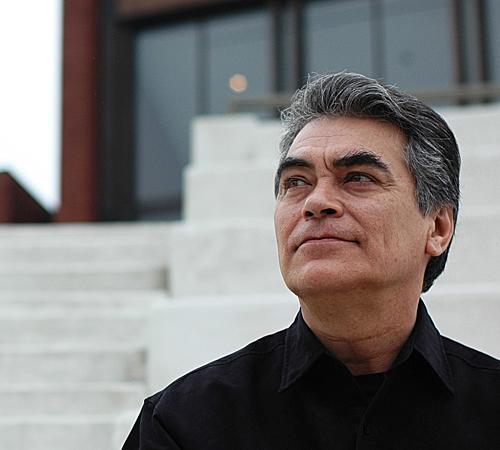Renaissance man

Apr 26, 2007
Maestro Eduardo Diazmu¤oz, director of Opera Studies at the University, works quietly behind his desk in an unadorned office at the Krannert Center for the Performing Arts. He occupies himself now with this season’s upcoming production, Joseph Turrin’s “The Scarecrow,” opening today.
Despite telltale streaks of silver in his thick dark hair, at the age of 53, Diazmu¤oz’s eyes sparkle with youthful energy when the topic of discussion turns to music.
“He’s great to work with,” said Bradley Culpepper, 30, a graduate student in Vocal Performance who has worked in every opera production Diazmu¤oz has conducted at the University. In “The Scarecrow,” Culpepper will appear in the role of the Governor.
“He’s like a little kid in (rehearsals),” Culpepper said, who also holds an assistantship in the opera’s Scene Shop. “He has so much energy and will listen to any concern you may have. He’s a great teacher and an excellent musician.”
The precision and vigor Diazmu¤oz draws out of his orchestras have brought him fame across the globe during his 32 years conducting. He is also respected as a composer, pianist, cellist, percussionist and lecturer.
Get The Daily Illini in your inbox!
In addition to his University position, Diazmu¤oz conducts the Bogotá Philharmonic orchestra’s performances in Colombia 10 weeks out of the year. He also teaches summer courses and master classes, judges international music competitions and occasionally composes his own music.
“I’ve found an overall balance … in life,” Diazmu¤oz said. Today he lives in Champaign with his wife Mayte (short for Maria Theresa), and their two children, Eduardo, 15, and Trasina, 12. His oldest son, Almitri, 34, lives in Los Angeles.
At the University, the conductor is known as the energetic, amiable presence that helped to revive the opera department alongside its general manager and principal vocal coach, Professor Tom Schleis.
“He has raised the quality of the orchestra-in-residence to a higher level,” Schleis said. “I respect him as a musician, and it is a joy to have him here.”
Diazmu¤oz champions the music of less known composers, including many from his native Mexico and other Latin American countries, such as Silvestre Revueltas and Carlos Chávez.
Joseph Turrin, who composed the music for “The Scarecrow,” is one such composer. Diazmu¤oz is excited to perform his new opera, which is based on a story by Nathaniel Hawthorne called “Feathertop.” Turrin himself will be attending a performance of his opera at the Krannert Center.
The story of “The Scarecrow” is of a jealous New England witch who seeks revenge by bringing a scarecrow named Feathertop to life to do her bidding. But she fails to figure into her schemes the scarecrow’s humanity and his capacity to love.
“The Scarecrow” is short – roughly 70 minutes, according to Barbara Hedlund, who helped familiarize Diazmu¤oz with Turrin’s opera music. A professional cellist, Hedlund met Turrin 20 years ago as a colleague in the New Jersey Symphony orchestra.
“When we think of contemporary, living composers, we erroneously think of strange, ‘weird’ music,” Diazmu¤oz said. But he said “The Scarecrow” is easier to listen to than many other modern works.
Diazmu¤oz says he sees himself as a bridge for music students between school and a professional career.
“I believe it is part of every artist’s responsibility to teach and to pass on knowledge to younger musicians,” he said.
Diazmu¤oz, known for his calm temper during rehearsals, says that he prefers demonstrating and explaining his vision rather than forcing it on his orchestras.
“It’s like being the head coach,” Diazmu¤oz said. “It’s your vision that counts, your responsibility.” His vision involves precise readings of the music, and he does not allow his orchestras to take many liberties or overly exaggerate a composer’s written notes.
Perhaps these many faithful interpretations helped him to garner his numerous awards. He won the prize of the Mexican Union of Theater and Music Chronicles four times, and the 2003 International Musician of the Year award from the International Biographical Centre in Cambridge, England.
He is also a two-time Latin Grammy Award nominee in the “Best Classical Album” category in 2000 and 2001, and the first Mexican conductor ever to be nominated for a Grammy.
Despite such laurels, Diazmu¤oz remains grateful for all his successes and wary of arrogance.
The greatest musicians, Diazmu¤oz said, do not place themselves proudly above everyone else, but desire to share their work and music. He says he wants to follow in their tradition.
“The greater they are, the humbler they become,” Diazmu¤oz said. “This makes them giants.”
He refers to the late Leonard Bernstein, his mentor and friend, as such a giant.
“Success should not change you,” he said. “Failure can be easier to deal with than success, because you learn from it. It should change you for the best.”
Regardless of his career’s ups and downs, nothing can detract from his great love – music. He recalls being moved to tears at age seven, lying under his family’s piano while his sister played Mozart.
“I love what I do passionately,” he said. “Whenever I can, I study and study and study.”
“It is a never-ending profession,” he said. “The musician is an eternal student. I guess every artist is.”





